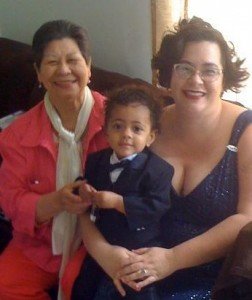
Our Community

My father came to America in September 1966; my mother came to America in December 1966, and each one from a different country.
They were taking citizenship classes offered at Abraham Lincoln High School in the Sunset District of San Francisco. On a rainy day, my father offered my mother a ride home and thus was the start of their relationship. I wouldn’t be born until 1974, but the awareness of social justice and basic human rights was born into me long before I came into the world.
After my mother became a US citizen she began to sponsor her siblings and relatives from El Salvador. Most of them came here legally with her direct or indirect help. To this day they continue to thank her for bringing them here. As a child, I vividly recall my parents turning one of our bedrooms into a stopping point for relatives. They would stay for a few days, weeks or months.
I recall vividly family members in our home and always having “guests,” but I did not fully understand the significance of what my parents were doing until I was much older. Through the 70’s and 80’s we had a constant stream of guests in our home and I was their shadow- always listening, watching and learning.
The purest of social justice and basic human rights were not outlined in my home studies, but it was demonstrated in the actions of my parents and how my family members treated each other. What I observed as a child and teenager I carry with me every day. To be kind. To be compassionate. To give freely and without any expectation of return. To offer support when asked and to lead when necessary.
Now as a mother myself, I want to instill in my child the understanding that we each have the ability to contribute to our community. I can’t give him the exact experience my parents gave me. However, I can pass along the immigrant experience through my story; I can share with him what it means to be a first generation American. I can show him how to treat people and when to identify mistreatment. I can show him how to be kind and compassionate.
I will allow a safe place for my child to lead a fulfilling life and become an active contributor to his community. As my parents once told me, and one day I will tell my child, “We can’t be with you all the time but we have taught you the difference between right and wrong. The rest is up to you.”
-Luba Palionny, an advisor at Tides

Read the stories and hear the voices of social change leaders fighting for justice.